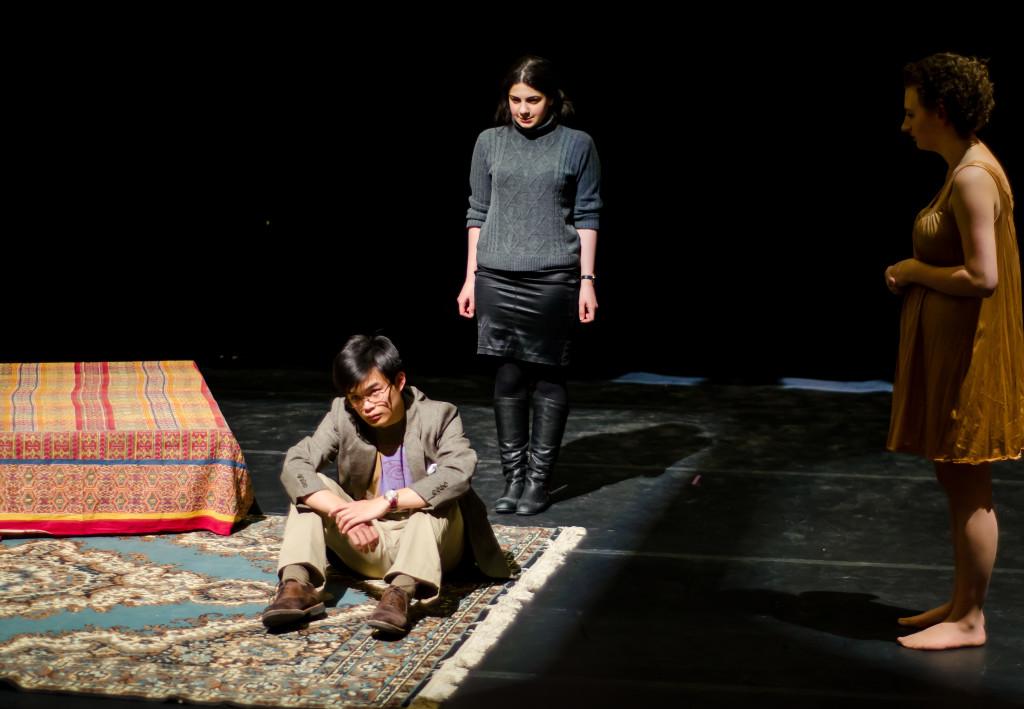
Emma Friedlander, Arts Editor
friedlan@grinnell.edu
Writing at the crossroads of historical fiction and magical realism, Salman Rushdie’s stories center around connections and migrations between cultures in the East and West. This weekend, students of THD-311 Studies in Performance will present “Three Stories from Salman Rushdie’s East, West,” theatrical adaptations of Rushdie’s fiction. This series of three one-acts was written, directed and designed entirely by THD-311 students under the guidance of Professor Lesley Delmenico, Theatre and Dance, and exemplifies the coming together of academics and outside-the-classroom experiences.
“The idea of the seminar is to take short stories from Salman Rushdie’s book ‘East, West,’ a collection of short stories that reflect on his dual heritage of being from India [as well as being] English. We’re taking three stories: one from the East portion, one from the West portion, one from the East-West. [My production team is] adapting ‘The Prophet’s Hair’ from the East portion, so it has a lot of Eastern mysticism. He’s taking these conventions that you look at and think ‘Eastern mysticism,’ but he adds this playful nature to it and this lighthearted humor,” said Joey Robertson ’19 who wrote the adaptation of “The Prophet’s Hair.”
Throughout the semester, THD-311 students have been practicing adapting literature to theatre. After months of reading and writing adaptations, the seminar will culminate in these final performances. To create each one-act, the nine students in the class were split into groups of three and then each assigned a role as writer, director or designer. Despite these different roles, the students have heavily collaborated with one another and their student cast to bring Rushdie’s stories to life.
“What was most challenging for me was trying to stay true to Rushdie and his intention,” Robertson said. “I had some trouble with that, but then I was helped by my group and Leslie into making it a more coherent vision.”
Grace Lloyd ’16 is the director of “The Prophet’s Hair,” and also worked hard to overcome the challenge of bringing Rushdie’s intricate and eccentric stories to life.
“A lot of what I’ve been doing … is trying to make sure that it is still a story,” Lloyd said. “While it’s a short story being brought to life on stage, it’s not just a play. Teaching the differences between narrator, half-narrator and then character is a big part of the process that we’ve been doing. Also trying to navigate everything — the words are a little verbose because it is Salman Rushdie. I’m trying to make everything make sense and be coherent to an audience that has never read the story, but still be able to get Salman Rushdie’s intended morals or meaning from the story at the end of it.”
Vital to truly encapsulating Rushdie’s vision in a powerful and theatrical way is the role of the designer: Ebony Chuukwu ’16 filled this position for “The Prophet’s Hair.”
“I’ve been helping with getting props, figuring out costumes for the cast, getting makeup done eventually,” Chuukwu said while working away on the show’s lighting design in Flanagan Theatre’s control booth. “It’s the process of creating the overall image of the show.”
These three roles are mirrored in the two other groups productions of one-acts this weekend. Another adaptation is “Christopher Columbus and Queen Isabella of Spain Consummate Their Relationship, Santa Fe, January, 1492” and the third is called “Harmony of the Spheres.” All of the teams worked hard to overcome and interpret Rushdie’s unique style of prose, which is known for its complicated nature and fantastical imagery.
“Specifically to Salman Rushdie, I wasn’t sure how it would look on stage,” Lloyd said. “For example, our story has a lot of violence. No giveaways, but there’s some stuff that happens at the end that’s hard to portray on stage. How do you convey things to your audience if they may not know the context of the story? How do you portray stuff on the stage without being over the top with it? I was definitely nervous about certain parts but we all worked through them.”
“All the groups have been lucky with having casts of such energetic students to work on the pieces with us,” Chuukwu added. “I think Rushdie’s stories can take very interesting turns and that’s been really interesting to see with our actors on stage.”
The adaptations will be put on for the public this Friday, May 6, and Saturday, May 7, at 7:30 p.m. in Flanagan Theatre.



















































